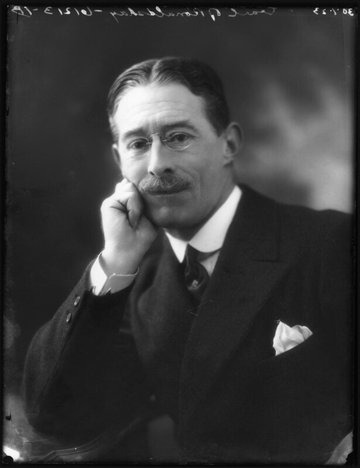
Lawrence John Lumley Dundas
‐
Politician and Secretary of State for India
Other names
Second Marquess of Zetland and Earl of Zetland, Earl of Ronaldshay in the county of Orkney
Place of birth
Place of death
Aske, Yorkshire
About
Lawrence John Lumley Dundas, second Marquess of Zetland, was an administrator in India, politician and author. Zetland was educated at Harrow School and at Trinity College, Cambridge. In 1900 he became aide-de-camp to Lord Curzon, who was Viceroy of India at the time. While in India Zetland travelled widely through Asia. His experiences would later become the inspiration for a number of fictional and non-fictional works. From 1917 to 1922 he was appointed Governor of Bengal. He held the post at one of the most critical times, having to deal with the fall-out from the partition (1905) and reunification (1911) of Bengal and rising political activism and unrest in the province. While his appointment initially provoked protests from Bengali nationalists because of his close association with Curzon, by the end of his governorship he was widely respected, even among initially critical nationalist politicians.
Zetland returned to Britain in 1922 and changed careers to become a writer. He was an active member of the Royal Central Asian, the India and the Royal Asiatic societies. He was elected President of the Royal Geographical Society in 1922. He published a travel book, Lands of the Thunderbolt: Sikhim, Chumbi and Bhutan (1923), followed by The Heart of Aryavarta (1925), for which he was elected to the British Academy in 1929. In the book Zetland explores Indian religion and philosophy, which he saw as closely connected to an understanding of Indian nationalism. Zetland admired many of Gandhi's ideas but differed with him on the point of his rejection of western civilization and British rule. In 1928 Zetland published the three-volume official biography of Lord Curzon to critical acclaim.
During the 1930s Zetland played an important role in the ongoing constitutional reform process of the Government of India. He was present at the Round Table conferences in the early 1930s and also served on the joint select committees of the House of Lords and House of Commons. Prime Minister Baldwin invited him to join his government in 1935 as Secretary of State for India, to help guide the 1935 Government of India Act through Parliament. With his political skills he was able to bypass conservative opposition and implement further steps towards future Dominion status for India and a devolution of power, by granting complete provincial responsibility, which he saw as part of a new conceptualization of ‘cooperative imperialism’.
With the outbreak of the Second World War, Zetland had to deal with the fall-out from the constitutional crisis triggered by Linlithgow’s unilateral declaration of war without consulting Indian representatives. This led to Congress’s non-cooperation in the war effort. In March 1940 Zetland survived Udham Singh’s assassination of Michael O’Dwyer at Caxton Hall. Zetland was present at the lecture when Singh shot at the podium from close range. Zetland was only grazed by a bullet, receiving bruises to his ribs. After Neville Chamberlain’s resignation as Prime Minister, Zetland also resigned from office, conscious that his approach to Indian affairs differed markedly from that of Winston Churchill, who succeeded Chamberlain as Prime Minister.
After leaving office, Zetland pursued his other interests. He was made a Knight of the Order of the Garter. He served as Lord Lieutenant of the North Riding, devoted more time to his long-standing role as Provincial Grand Master of the Freemasons of the North and East Ridings of Yorkshire and was Governor of the Bank of Scotland.
Stanley Baldwin, Surendranath Banerjea, Albion Rajkumar Banerji, Jagadish Chandra Bose, Maharaja of Cooch Behar, Stafford Cripps, George Curzon, Bhalabhai Desai, M. K. Gandhi, Gopal Krishna Gokhale, Samuel Hoare, Mohammed Ali Jinnah, Chaudry Khaliquzzaman, Lord Linlithgow, Jawaharlal Nehru, Firoz Khan Noon, Mr Siddiqi, Lord Templewood.
British Academy, India Office, Royal Asiatic Society, Royal Central Asian Society, Royal Geographical Society (President).
Sports and Politics under an Eastern Sky (Edinburgh and London: Blackwood, 1902)
A Wandering Student in the Far East (Edinburgh and London: Blackwood, 1908)
India: An Eastern Miscellany (Edinburgh and London: William Blackwood, 1911)
Tour of His Excellency the Right Honourable Lawrence John Lumley Dundas, Earl of Ronaldshay, Governor of Bengal (Dacca: Private Secretary Press, 1917–19)
Speeches Delivered by His Excellency the Right Honourable Lawrence John Lumley Dundas, Earl of Ronaldshay Governor of Bengal during 1919–20 (Calcutta: Private Secretary Press, 1920)
Lands of the Thunderbolt: Sikhim, Chimbi and Buthan (London: Constable & Co., 1923)
India: A Bird's Eye View (London: Constable and Co., 1924)
The Heart of Aryavarta: A Study of the Psychology of Indian Unrest (London: Constable & Co., 1925)
The Life of Lord Curzon: Being the Authorized Biography of George Nathaniel Marquess Curzon of Kedleston KG, 3 vols (London: Ernest Benn, 1928)
Great Britain and India (Birmingham and Midland Institute: Presidential Addresses, 1930)
Lord Cromer: Being the Authorized Life of Evelyn Baring First Earl of Cromer (London: Hodder & Stoughton, 1932)
Steps towards Indian Home Rule (London: Hutchinson, 1935)
India: Retrospect and Prospect (Nottingham: University College Nottingham, 1935)
'Essayez': The Memoirs of Lawrence, Second Marquess of Zetland (London: John Murray, 1956)
Laithwaite, Gilbert, The Marquess of Zetland, 1876–1961 (London: Oxford University Press)
‘Lord Zetland’, Obituary, Guardian (7 February 1961), p. 13
Obituary of Marquess of Zetland, The Times (7 February 1961), p. 13
Rizvi, Gowher, Linlithgow and India: A Study of British Policy and the Political Impasse in India, 1936–1943 (London: Royal Historical Society, 1978)
Mss Eur D 609, Indian correspondence and papers, Asian and African Studies Reading Room, British Library, St Pancras
Image credit
Lawrence John Lumley Dundas, 2nd Marquess of Zetland, by Bassano Ltd, whole-plate glass negative, 30 January 1923, NPG x122264
© National Portrait Gallery, London, Creative Commons, http://creativecommons.org/licenses/by-nc-nd/3.0/
